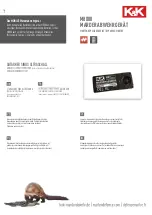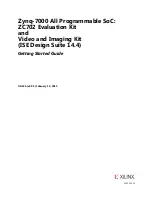
Philips Semiconductors
ISP1362 Linux Stack User’s Guide
UM10012-_2
© Koninklijke Philips Electronics N.V. 2003. All rights reserved.
User’s Guide
Rev. 1.2—July 2003
21 of 34
This script mounts the OTG mass storage disk data from Accelent IDP ROM to RAM.
4.3.2.
Loading the Stack
The ISP1362 Linux stack modules (kernel as well as application) are dynamically loaded and unloaded to the
kernel.
•
Log on to the system as root, go to the ISP1362 object directory and use the script to load modules.
#cd /home/1362/objs
#./imod
•
If you execute the
/sbin/lsmod
command, you will notice that the following modules are loaded:
mscd, pdc, phci, otg, hal
You should also see the
msdisk
application running as an application process when you list the current
running processes (
ps
).
4.3.3.
Unloading the Stack
•
As root of the system, go to the ISP1362 Linux source directory and use the script to unload module.
#cd /home/1362/objs
#./rmod
•
If you execute the
/sbin/lsmod
command, you should not see any of the following modules as loaded:
mscd, pdc, phci, otg, hal
Also, you should not see the
msdisk
application as a running process when you list the current running processes
(
ps
).
4.3.4.
Closing the ISP1362 Stack
Before the Accelent IDP is shutdown, you need to close the ISP1362 stack to copy the OTG mass storage data
changes in the RAM to the ROM. To do so, execute:
#cd /home/1362/objs
#./close_stack
4.4.
ISP1362 Host Stack
Working with the ISP1362 host stack is similar to working with any other Host Controller on Linux. Once the
ISP1362 stack modules are loaded, you can work with any devices connected to the standard USB port of the
ISP1362 evaluation kit
—assuming the kernel has drivers, root file system has application and proper environment
is set for the corresponding connected device
. A
generic
example on setting up the host stack evaluation is given
in the following diagram.















































